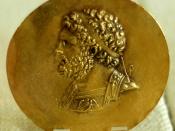The term Genius has its roots in Latin and means guardian spirit, WebsterÃÂs Dictionary defines genius in a number of ways, including: a person with Extraordinary intellectual and creative power, a person of extraordinary intellect and talent, a person who has an exceptionally high intelligence quotient, typically above 140, a strong natural talent, aptitude, or inclination or one who has such a talent or inclination. Alexander III of Macedon, more commonly known as Alexander the Great, is to many historians, a genius for his statesmanship and his military might. In this paper I will further illustrate some of AlexanderÃÂs cultural and social achievements, providing a clearer illustration for the reasons why he is deemed a genius.
BackgroundHistorical records show that Alexander the Great or in Greek: Alexandros III o Makedon, meaning "Defender of Men", was born in Pella, Macedonia, the area around present day Thessaloniki in northern Greece, in late July of 356 BC, on the same day on which the famous Temple of Artemis at Ephesus was destroyed by fire.
According to John J. Popovich, his father, Philip II of Macedon, was a brilliant ruler and strategist. His mother was Olympias, princess of Epirus, daughter of King Neoptolemus. Olympias was initiated into the cults of Dionysus and Orpheus. She was often jealous, vindictive and very protective of Alexander.
Popovich describes the boy Alexander as, ÃÂfearless and strong. At the age of twelve, he tamed the beautiful and spirited Bucephalus ("ox-head" in Greek), a horse that no one else could ride. Philip was so proud of Alexander's horsemanship that he said: O my son, seek out a kingdom worthy of thyself, for Macedonia is too little for thee.
Later, this famous stallion carried him as far as India up to the Hydaspes River, where he died. There Alexander built...

![Alexander Muir Public School, Toronto, 1902 [OHQ-PICTURES-S-R-599]](https://s.writework.com/uploads/9/95250/alexander-muir-public-school-toronto-1902-ohq-pictures-s-r-5-thumb.jpg)
